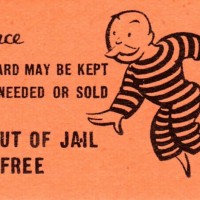The New York Times reports on a court case involving whether an artist working for salary as teaching faculty can claim tax deductions of artist's expenses (for supplies, travel, meals, etc) in excess of profits earned on sales of art. My understanding of this (tax people please correct me if I have this wrong) is that these net losses can be applied against salary and other earnings, thus lowering the tax owing: The I.R.S., which accused Ms. Crile of underpaying her taxes by more than $81,000 from 2004 to 2009, argued that based on several … [Read more...]
Is Amazon.com a monopoly? (updated October 10)
In a comment on my previous post, on Amazon and what I saw as overheated rhetoric regarding censorship, BobG wrote: Arguing over a definition of censorship is avoiding the actual issue. Amazon IS making it difficult to get certain books (that’s their announced strategy) and they are poised to become the single biggest (if not the only) source for books in the U.S. If Amazon becomes the primary supplier of books as well as the conduit through which we get books (and hence the ability to prevent us from getting books), that gives them an … [Read more...]
This is not censorship (updated, again)
The New York Times reports on authors forming a group to back publisher Hachette in its quest to have Amazon.com charge consumers higher prices for books. A literary agent is quoted: “It’s very clear to me, and to those I represent, that what Amazon is doing is very detrimental to the publishing industry and the interests of authors,” the agent said. “If Amazon is not stopped, we are facing the end of literary culture in America.” And author Ursula Le Guin: “We’re talking about censorship: deliberately making a book hard or impossible to … [Read more...]
What have the Romans ever done for us?
Think of your cultural consumption in your late teens. It was pretty great, wasn't it? Favorite bands, and getting their new LP within days of release, favorite magazines about music and films and books, lining up to get tickets for the movie everyone in the papers was talking about. I have my own list of memorable moments, I think we all do. And we remember what was best - the great concert, the cover of an issue of Rolling Stone you kept lying around for years after, the movie you talked about with your friends for hours following the … [Read more...]
How should we subsidize charitable giving to the arts?
In the New York Times, Nicholas Kristof and Sheryl WuDunn write: Moms in poverty often live in stressful homes while juggling a thousand challenges, and they are disproportionately likely to be teenagers, without a partner to help out. A baby in such an environment is more likely to grow up with a brain bathed in cortisol. Fortunately, a scholar named David Olds has shown that there are ways to snap this poverty cycle. Mr. Olds began his career working with 4-year-olds, but then decided that many children were already traumatized and … [Read more...]
Night at the museum
Back in February, Business Week reported: When Maxwell Anderson took over as director of the Dallas Museum of Art (DMA) two years ago, he told the board he wanted to offer free memberships to anyone willing to share some data—even when it’s just their name and e-mail address. Anderson’s idea is novel in the staid world of art museums, but it echoes what companies such as Google (GOOG) and Facebook (FB) have long understood: Learning as much as you can about your customers’ behavior can be more valuable than the price of admission. “We’re … [Read more...]
Wellbeing and how to fund the arts
Via The Stage, what arts funding should have priority? The (UK) All-Party Parliamentary Group on Wellbeing Economics has released a report recommending that changes in the wellbeing of individuals ought to be the central concern of policy, beyond calculations of narrower economic measures such as are at the core of standard cost-benefit analysis. They have striking recommendations for arts policy. First, about wellbeing economics. In essence, the leading economic indicators we see reported most commonly have obvious effects on wellbeing. We … [Read more...]
Artists should not retain copyright in publicly commissioned art (Updated)
An interesting story from Portland, Oregon, on the copyright held by sculptor Raymond Kaskey in his statue Portlandia. Willamette Week reports on his close guarding of reproduction rights in the large, iconic statue made 30 years ago, commissioned by the city: You would think the image of Portlandia would adorn postcards, photos and T-shirts. She doesn’t. That’s because her maker, Washington, D.C.-based sculptor Raymond Kaskey, has, over the past three decades, often threatened to sue those who dare use photos or illustrations of Portlandia … [Read more...]
Local arts funding and urban design: responses
My thanks to those who took the time to comment on my most recent post. As usual - and this is for the good! - discussion went in unexpected directions. One commenter wrote, in response to my line that local government arts funders should respond to local tastes: Should “taste” be the deciding factor of who and what get’s funded in the arts? Shouldn’t governmental or even foundational funding sources take into consideration the minority voice just as our constitutional government is required to consider not just the voice (taste) of the … [Read more...]
Local arts funding and urban design
In the United States, most public funding for the arts happens at the local, rather than the state or federal, government level. And there are good reasons for that; this is a big, diverse, dispersed country, and local arts councils are best placed to respond to residents' tastes and cultural traditions. What kind of city design best facilitates a lively cultural scene? I had always thought of density as key - lots of residents around a core give the opportunity for various amenities - culture, cuisine, shops - to generate income and … [Read more...]










